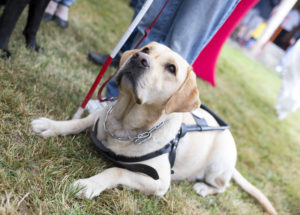
Home Care in Mt. Laurel NJ: August 8th is Assistance Dog Day: How Could an Assistance Dog Help Your Parent?
Assistance Dog Day is celebrated on August 8th. If your parent already has an assistance dog (sometimes called a service dog), it’s a great day to celebrate the help the dog provides your parent and maybe give him a little extra love and attention. And, if your parent does not have an assistance dog, now is a good time to think about whether one might be right for your parent. There are a lot of things an assistance dog can be trained to do, like picking up dropped items, opening doors, alerting someone with hearing loss to important sounds, and so much more. An assistance dog can’t replace the need for family caregivers and professional home care providers, but they can add one more level of support for your elderly parent.
Assistance Dogs and the ADA
Under the Americans with Disabilities Act (ADA), service dogs are defined as “any dog that is individually trained to do work or perform tasks for the benefit of an individual with a disability, including a physical, sensory, psychiatric, intellectual, or other mental disability.” By law, a trained service dog is allowed to accompany their handler (the disabled person) into public places, including stores and restaurants. The U.S. Department of Justice does not consider an emotional support or companion dog a service dog, so they are not covered under the act.
The act does not address the breed or size an assistance dog must be, so any dog, including a mixed breed can become an assistance dog. Typically, people are used to seeing Labrador Retrievers, Poodles, and Golden Retrievers used as service dogs because they are commonly used as guide dogs for the blind. However, the breed of dog should fit the lifestyle and needs of the disabled person.
Assistance Dog Jobs
There are many different kinds of jobs that an assistance dog can be trained to perform. Some of those jobs are:
Guide Dogs: These dogs help blind and visually impaired people to navigate, guiding them around obstacles.
Mobility Assistance Dogs: These dogs are trained to do things for people with mobility issues, including those in wheelchairs. They can be trained to do many things, like pick objects up, push buttons on automatic doors, or offer balance assistance.
- Diabetic Alert Dogs: Dogs can be trained to sniff out chemical changes that occur in the body when a person’s blood sugar levels are too high or too low.
- Hearing Dogs: Hearing dogs are trained to alert people with hearing loss to important sounds, such as a phone ringing, a fire alarm, or a doorbell.
- Psychiatric Service Dogs: These dogs are most commonly used for people with post-traumatic stress disorder (PTSD), but are also used for people with depression and anxiety.
Although an assistance dog can’t perform many of the tasks a home care provider does, they can be an excellent addition to your parent’s care team. An assistance dog can help your parent during those times between home care provider visits. They are also a wonderful source of companionship and unconditional love, so your parent won’t feel alone when there are no other people around.
Sources
http://www.dogster.com/lifestyle/10-types-of-service-dogs-and-what-they-do
https://www.ada.gov/regs2010/service_animal_qa.html
For home care in Southern NJ and the surrounding areas, call and talk to us at Home to Stay Healthcare Solutions (856) 321-1500.







